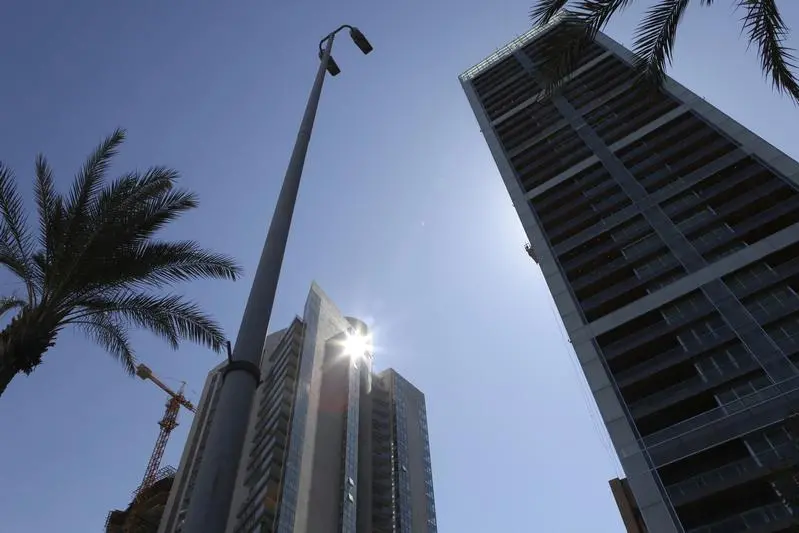PHOTO
BEIRUT - A senior judge said Thursday that corruption in the real estate sector wass costing Lebanon up to $40 million a year. “We estimate that corruption in the Finance Ministry’s real estate departments is costing the Treasury between $30 million and $40 million a year,” Ali Ibrahim, the appointed judge at the Special Investigation Commission, told The Daily Star.
Finance Minister Ali Hasan Khalil has spearheaded a campaign to overhaul the ministry’s real estate departments and issued harsh warnings to government staff who may have been involved in suspicious deals.
The minister also ordered the removal of key personnel at those departments and referred them to the prosecution office.
Ibrahim said that some employees who appraise the value of sold apartments on some occasions gave lower estimates, thus depriving the Treasury of the real taxes and fees owed on these properties. He added that corruption in the real estate sector is one of many instances of corruption in the country.
But Ibrahim stressed that cooperation between all government and public departments would reduce corruption levels.
“If our institutions worked together then this would be a prelude to combating corruption in the country,” he said.
“I also gave examples during a conference about a certain case which I personally handled,” he added.
Ibrahim recalled that the former head of the Higher Relief Council, Ibrahim Bashir, was exposed after opening a $2 million account in his wife’s name.
“The bank asked Bashir’s wife if she was working and she told them that she was only a housewife and added that her husband transferred $2 million from the Higher Relief Council’s account to her name.
“The bank immediately called the Central Bank and authorities.
“As a result, Bashir was arrested and sentenced to seven years in jail,” Ibrahim recalled.
He added that banks usually check all cash transfers by their clients as part of the Now Your Customer banking regulation.
If clients open very large accounts, banks summon them to verify their sources.
Asked what would be the most effective way to stamp out corruption in Lebanon, Ibrahim said that the best and easiest way is through the ballot box. “The Lebanese need to elect the right people to run their affairs. If we don’t do that then we won’t have real change in the country,” he said.
Ibrahim made positive comments concerning the SIC’s work in combatting money laundering and financial embezzlement.
In 2016, Lebanon lifted banking secrecy in 42 cases of suspected involvement in money laundering, embezzlement and terrorist funding, according to SIC’s 2016 report.
It said the SIC received 470 suspected cases and investigated 399 of them, adding that 71 cases were still pending, which means that the SIC will determine whether they will be prosecuted depending on the strength of the evidence. The SIC said that out of the cases examined, 163 involved embezzlement of private funds, 63 forgery, 23 terrorism or terrorism funding and 11 fraud. The report gave examples of the cases that were cracked by Lebanon’s financial authorities.
Finance Minister Ali Hasan Khalil has spearheaded a campaign to overhaul the ministry’s real estate departments and issued harsh warnings to government staff who may have been involved in suspicious deals.
The minister also ordered the removal of key personnel at those departments and referred them to the prosecution office.
Ibrahim said that some employees who appraise the value of sold apartments on some occasions gave lower estimates, thus depriving the Treasury of the real taxes and fees owed on these properties. He added that corruption in the real estate sector is one of many instances of corruption in the country.
But Ibrahim stressed that cooperation between all government and public departments would reduce corruption levels.
“If our institutions worked together then this would be a prelude to combating corruption in the country,” he said.
“I also gave examples during a conference about a certain case which I personally handled,” he added.
Ibrahim recalled that the former head of the Higher Relief Council, Ibrahim Bashir, was exposed after opening a $2 million account in his wife’s name.
“The bank asked Bashir’s wife if she was working and she told them that she was only a housewife and added that her husband transferred $2 million from the Higher Relief Council’s account to her name.
“The bank immediately called the Central Bank and authorities.
“As a result, Bashir was arrested and sentenced to seven years in jail,” Ibrahim recalled.
He added that banks usually check all cash transfers by their clients as part of the Now Your Customer banking regulation.
If clients open very large accounts, banks summon them to verify their sources.
Asked what would be the most effective way to stamp out corruption in Lebanon, Ibrahim said that the best and easiest way is through the ballot box. “The Lebanese need to elect the right people to run their affairs. If we don’t do that then we won’t have real change in the country,” he said.
Ibrahim made positive comments concerning the SIC’s work in combatting money laundering and financial embezzlement.
In 2016, Lebanon lifted banking secrecy in 42 cases of suspected involvement in money laundering, embezzlement and terrorist funding, according to SIC’s 2016 report.
It said the SIC received 470 suspected cases and investigated 399 of them, adding that 71 cases were still pending, which means that the SIC will determine whether they will be prosecuted depending on the strength of the evidence. The SIC said that out of the cases examined, 163 involved embezzlement of private funds, 63 forgery, 23 terrorism or terrorism funding and 11 fraud. The report gave examples of the cases that were cracked by Lebanon’s financial authorities.
Copyright © 2018, The Daily Star. All rights reserved. Provided by SyndiGate Media Inc. (Syndigate.info).





















